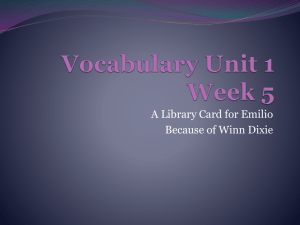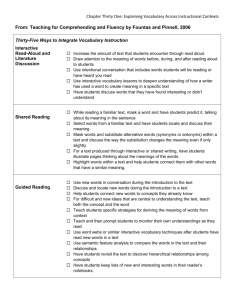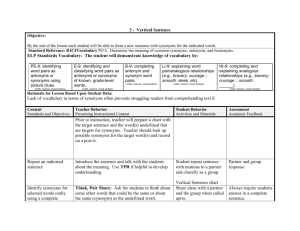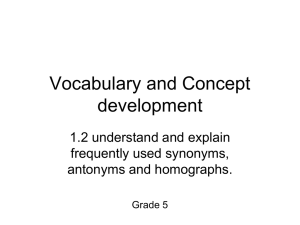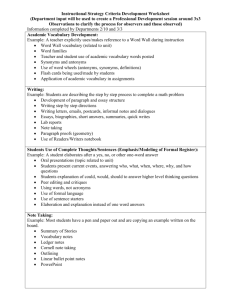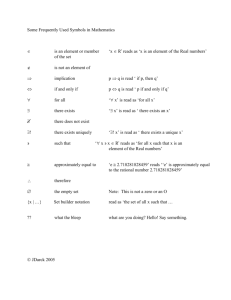Higher-order Concepts - People Server at UNCW
advertisement
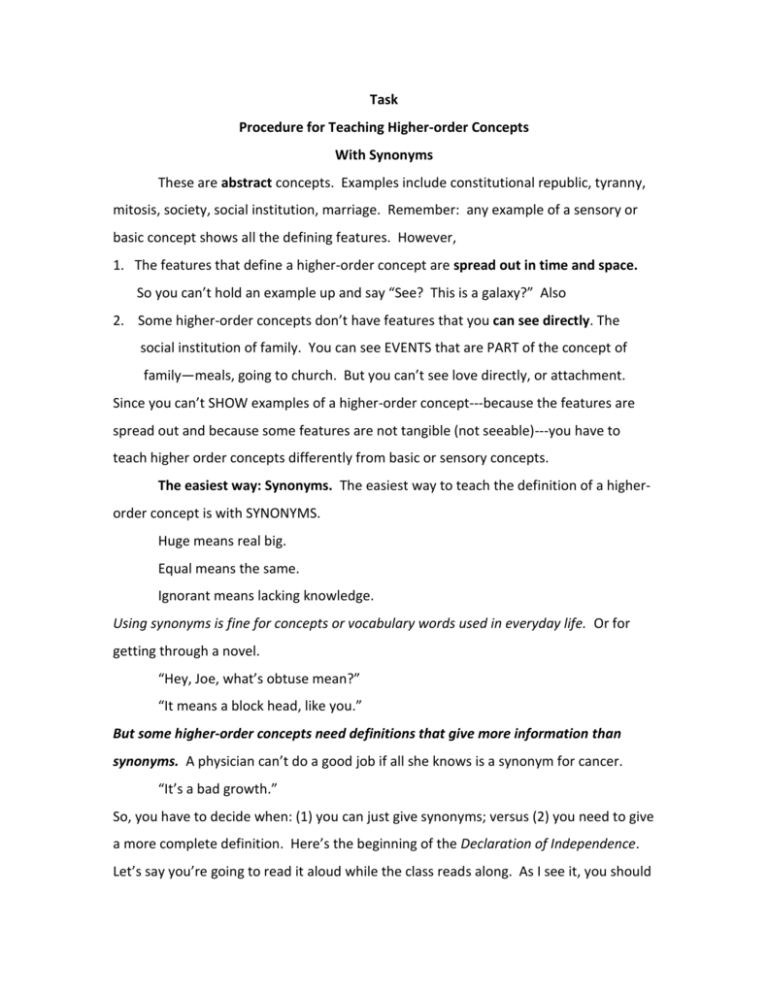
Task Procedure for Teaching Higher-order Concepts With Synonyms These are abstract concepts. Examples include constitutional republic, tyranny, mitosis, society, social institution, marriage. Remember: any example of a sensory or basic concept shows all the defining features. However, 1. The features that define a higher-order concept are spread out in time and space. So you can’t hold an example up and say “See? This is a galaxy?” Also 2. Some higher-order concepts don’t have features that you can see directly. The social institution of family. You can see EVENTS that are PART of the concept of family—meals, going to church. But you can’t see love directly, or attachment. Since you can’t SHOW examples of a higher-order concept---because the features are spread out and because some features are not tangible (not seeable)---you have to teach higher order concepts differently from basic or sensory concepts. The easiest way: Synonyms. The easiest way to teach the definition of a higherorder concept is with SYNONYMS. Huge means real big. Equal means the same. Ignorant means lacking knowledge. Using synonyms is fine for concepts or vocabulary words used in everyday life. Or for getting through a novel. “Hey, Joe, what’s obtuse mean?” “It means a block head, like you.” But some higher-order concepts need definitions that give more information than synonyms. A physician can’t do a good job if all she knows is a synonym for cancer. “It’s a bad growth.” So, you have to decide when: (1) you can just give synonyms; versus (2) you need to give a more complete definition. Here’s the beginning of the Declaration of Independence. Let’s say you’re going to read it aloud while the class reads along. As I see it, you should define all of the words in bold face, or else students won’t understand what the documents says. The words in bold face could be defined quickly, with a synonym or two. But words in boldface and italics need full definitions---students need to know MORE about them than a synonym gives. So, The class reads the passage twice. 1. The first time through, the teacher gives definitions as she reads a sentence and as students read along. Then she reads the sentence again as it is written. The whole passage is read. 2. The class reads it again and discusses it. [What the teacher says is in brackets.] Here’s the passage. When in the Course of human events it becomes necessary for one people to dissolve the political bands which have connected them with another and to assume among the powers of the earth, the separate and equal station to which the Laws of Nature and of Nature's God entitle them, a decent respect to the opinions of mankind requires that they should declare the causes which impel them to the separation. We hold these truths to be self-evident, that all men are created equal, that they are endowed by their Creator with certain unalienable Rights, that among these are Life, Liberty and the pursuit of Happiness. So, the first reading might look like this. When in the Course of human events [“Course of human events means history.”] it becomes necessary for one people [“Means a large group, as colonists or English Peoples, that has a common identity, and inhabits a territory that it claims to be theirs.”] to dissolve the political bands [“Means end a political relationship between a ruling group—The British government---and a subject group---the colonists] which have connected them with another and to assume among the powers of the earth [“That is, other nations.”], the separate and equal station to which the Laws of Nature [“Means physical laws about how things work. He’s making the claim that splitting from British rule is not just a frivolous choice, but that human beings are deigned by nature to reject tyranny.”] and of Nature's God [“Means the God that made nature as it is. So, the desire to split from British rule is part of God’s plan.”]entitle them, a decent respect to the opinions of mankind requires that they should declare the causes which impel [“Motivate them strongly and irresistibly.”] them to the separation [“That is, dissolving the political bands.”]. We hold these truths [“A claim that the statements that come next are not opinions, but represent the truth---the way things ARE.”] to be self-evident [“Obvious.], that all men [“Humans, not just males.”] are created equal [“Born as human beings with the same value and the same rights. He doesn’t mean superficial things like weight and eye color.”], that they are endowed [“Given”] by their Creator with certain unalienable Rights [“Unalienable rights are rights that can’t be taken away because they are part of humanity itself. Government can’t claim that it grants these rights---it can’t separate or alienate these rights from human beings. Examples would be life, liberty, and activities for selfimprovement. Unalienable rights would NOT include superficial things such as a right to have a house, the right to have the government take care of you, or the right to have other persons speak nicely to you.”] that among these are Life, Liberty and the pursuit of Happiness. [“Pursuit of happiness means improve yourself, such as getting an education and keeping money that you earn.] Your turn. Here’s an excerpt from Gibbon’s Decline and fall of the Roman Empire. The main point is that when Roman landowners served in the Legions, patriotism was natural; it flowed from their stake in Rome. But when soldiers were mercenaries---paid to fight---the motive to obey orders and to fight hard had to have a different source. On his first entrance into the service, an oath was administered to him with every circumstance of solemnity. He promised never to desert his standard, to submit his own will to the commands of his leaders, and to sacrifice his life for the safety of the emperor and the empire. The attachment of the Roman troops to their standards was inspired by the united influence of religion and of honor. The golden eagle, which glittered in the front of the legion, was the object of their fondest devotion; nor was it esteemed less impious than it was ignominious, to abandon that sacred ensign in the hour of danger. ^34 These motives, which derived their strength from the imagination, were enforced by fears and hopes of a more substantial kind. Regular pay, occasional donatives, and a stated recompense, after the appointed time of service, alleviated the hardships of the military life, whilst, on the other hand, it was impossible for cowardice or disobedience to escape the severest punishment. The centurions were authorized to chastise with blows, the generals had a right to punish with death; and it was an inflexible maxim of Roman discipline, that a good soldier should dread his officers far more than the enemy. From such laudable arts did the valor of the Imperial troops receive a degree of firmness and docility unattainable by the impetuous and irregular passions of barbarians…. What words do you think you could define quickly, with synonyms, while you and students do a first reading? What words need a full definition? Go ahead and insert definitions by synonyms.

